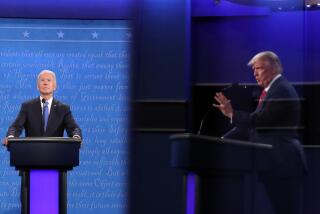Bushâs Problems: How Insurmountable? : Voters deserve a chance to decide the issue of a second term
With the Republican National Convention in Houston little more than 10 days away, the President of the United States is not looking that good. In the polls he stands about as low as one can, though only a year or so ago he stood about as high as any President ever got. This is not surprising. The economy is terrible, the states and the cities are in trouble and the White House has failed to offer a coherent economic message.
The Bush reelection campaign even seems unable to decide whether to take a road low or high and was recently forced to disavow an obnoxious and juvenile press release about opponent Bill Clinton.
LOW ROAD, HIGH ROAD?: The unequivocal White House disavowal was most welcome, and it is to be hoped that the campaign will stay glued to the high road. Not in recent memory has the nation been in such grave need of a thorough and serious debate on the issues. The American people donât want a campaign of invective or phony issues. There are enough real ones to address.
President Bushâs abysmal standing in the polls has led some people--in both his party and in the press--to urge that he not stand for reelection. But is that really fair? Such a recommendation would be plausible if a President were guilty of malfeasance in office, or if he were patently incompetent. But does either charge really apply in this case?
On the contrary, Bush, elected by a large margin in 1988 and until not long ago a popular President, ought to have a chance to be judged by the voters again--not the pundits or extremist partisans--just as ultimately it is the voters who should decide whether Clinton deserves to become President.
In making that determination, voters will want to reflect not only on Clintonâs years as governor and the case he now makes for his candidacy but on the record of the Bush Administration. That record is not without significant accomplishments, even as it is also not without its significant problems.
The quarrel with Bush has centered primarily in the area of the economy and domestic policy. The President needs to develop and articulate a range of policy options to cope with the very troubled economy. He has not done that.
LOW POINTS, HIGH POINTS: In other areas of domestic policy the Administrationâs program has been weak or partisanly pugilistic (including the mounting of unnecessary fights on civil rights legislation and the digging in with ideological shovels on abortion rights) or very poorly articulated (the famous âvision thingâ).
On the plus side, Bush has offered a generally outstanding Middle East policy that has resolutely helped force Israel to face reality; and during the Iraq war he adroitly marshaled the power of the international community. In other areas of foreign policy, too, Bush has demonstrated real leadership through his very able secretary of state, James A. Baker III.
Probably the desultory economy will prove to be the one issue that will most influence voters in the fall, unless America experiences an unexpected upsurge. Would the American economy be healthier today if the Bush Administration had done a better job? Does Clinton have more powerful ideas? Is it time for a change at the top? Or is it best to renew Bushâs mandate? These are questions that voters have the right to decide.
As the Republicans prepare to nominate Bush for a second term, as they should, we look forward to a vigorously contested face-off between President Bush and Gov. Clinton in the fall.
More to Read
Get the L.A. Times Politics newsletter
Deeply reported insights into legislation, politics and policy from Sacramento, Washington and beyond. In your inbox three times per week.
You may occasionally receive promotional content from the Los Angeles Times.









